- Home
- Ann M. Martin
Stacey McGill... Matchmaker?
Stacey McGill... Matchmaker? Read online
Dedicated to Ren Roome and Ann Ross Roome
Contents
Title Page
Dedication
Chapter One
Chapter Two
Chapter Three
Chapter Four
Chapter Five
Chapter Six
Chapter Seven
Chapter Eight
Chapter Nine
Chapter Ten
Chapter Eleven
Chapter Twelve
Chapter Thirteen
Chapter Fourteen
Chapter Fifteen
Letter from Ann M. Martin
Acknowledgment
About the Author
Scrapbook
Also Available
Copyright
I closed my book and drummed my fingers on its cover. Pride and Prejudice by Jane Austen. I’d groaned when Mom suggested reading it together. After all, how exciting could the lives of prim, proper people in the 1800s be? But to my surprise it was much more interesting than I’d expected.
“I’m almost ready, Stacey,” Mom called into the living room, where I sat. She was across the hall in the dining room, pulling out our good dishes from the hutch and laying them on the table for inspection. This is something she does every year before Thanksgiving.
I’d asked Mom for a few extra minutes so I could finish the chapter I was reading. You see, we’d agreed to start a mother-daughter reading group. The idea was, we’d pick a book and then both read it. Each week we’d sit together and discuss the chapters we’d read.
When I’d finished reading, I walked to the dining room. “Mom, what exactly are we doing for Thanksgiving dinner this year?” I asked.
She looked up blankly from the dish she’d been inspecting. I noticed a hairline crack across the middle. “I’m sorry, what did you say?” she asked.
“Thanksgiving,” I repeated. “What are we doing?”
“I’m not sure,” she admitted. Before Mom and Dad were divorced, they always invited friends to dinner. (Most of our family lives too far away to visit.) But since the divorce, Mom has pretty much drifted away from the couples she and Dad used to hang out with. Besides, most of them are in New York City, where Dad still lives. But Mom and I live in Stoneybrook, Connecticut. Although it’s less than two hours from the city, it feels farther away. That may be because it’s so quiet and suburban — so completely different from the city. It’s enough of a distance to make us both lose track of most of our old friends.
I have two advantages over Mom, though. The first major plus is that I’ve made amazing new friends. We’re all part of a group called the Baby-sitters Club. (I’ll tell you more about that later.)
Second, I still travel to the city on a regular basis to visit Dad. You could say I lead a double life. I’m part suburban Stoneybrooker and part city girl. My boyfriend, Ethan, lives in the city too, so I have lots of reasons to want to get into New York as much as I can.
Mom, though, almost never goes into the city. She’s too busy with her job as a buyer for Bellair’s Department Store, which is here in Stoneybrook. (A buyer is someone who selects the things the store is going to sell to its customers.) She says there’s no reason for her to go to the city, except when she has to go to Manhattan for work.
I argue that there are museums, plays, movies — a zillion other reasons for her to go. She just shrugs and says everything comes to Stamford eventually. (Stamford is the city closest to Stoneybrook.) I always shriek, “Stamford! How can you compare Stamford to New York City?” No offense to Stamford, but it is not an international center of culture and business like Manhattan.
Mom laughs and says she spent her whole life in New York City, and now she’s happy to live at a slower pace.
Okay, I can accept that. But what I don’t understand is why she hasn’t made many friends. “Adults don’t make new friends the way young people do,” she insists. “Besides, I’m too busy right now for new friendships.”
That sounds like a pretty lame excuse. Yes, she’s got a job, but she’s not a workaholic like my dad. He’s a lawyer and he lives and breathes his job. Mom doesn’t do that — thank goodness. And it’s not as if she has eight kids or something. There’s only me.
Of course, it’s none of my business. Mom can live her life any way she chooses. I just think she must be lonely. Who wouldn’t be?
Mom hasn’t had a single date since the divorce. My dad already has a new steady girlfriend, Samantha. I’m not eager for a stepdad, but it would be nice for Mom if she went out once in awhile.
Sure, she’s got me, and we’re extremely close. Closer, I think, than most mothers and daughters. But I’m thirteen. Doesn’t she want adult friends too? I mean, I love her — totally — but I wouldn’t want to spend all my free time with her.
“I’ll think about Thanksgiving later,” she said, putting down the cracked dish. “It’s almost three weeks away, after all.”
“Good idea,” I agreed. “Let’s talk about the book.”
We went to the living room and sat on the couch. I plucked a carrot stick from a plate on the coffee table. It was my midafternoon snack. Mom waited patiently for me to finish it. She knows I can’t let myself get hungry because I have a chronic (meaning, never-ending) condition called diabetes.
A diabetic can’t properly regulate the amount of sugar in his or her bloodstream. This happens automatically for most people. In my case, I have to give myself daily injections of something called insulin. I also have to eat only healthy foods, no sweets or junk food. And, as I said, I can’t skip meals or let myself get hungry.
Not paying attention to these things could be a majorly big deal. (I’m talking coma or even death.) But if I do what I’m supposed to do, it’s not a problem. By now, it’s become second nature for me to eat right and take my injections. I hardly even notice it.
When I’d finished munching, Mom sat forward on the couch. “So? What do you think of the book so far?” she asked.
“It’s good,” I admitted. “Elizabeth is pretty cool.” Elizabeth Bennett is the main character and not at all what you’d expect from a young woman from that era. I thought she’d be prim and proper. But she’s outspoken and witty, even mischievous, in a way.
“I think her independence shows that she’s brave,” Mom said. “When you consider how little opportunity there was for women in those days, it takes real guts to stand on her own the way she does.”
“I know,” I agreed. “You have to admire someone who would rather be poor than degrade herself by trying to snare a rich husband.”
Mom nodded. “Especially when that was what all the other women around her were doing. It shows a lot of self-respect and pride.”
“Maybe too much pride,” I suggested as an idea came to me.
“What do you mean?” Mom asked.
“Well … she’s so proud that she assumes Mr. Darcy is looking down on her because she’s poor. But she doesn’t really know that to be true. She snubs him before he can snub her. Isn’t that reverse snobbery? Shouldn’t she at least give him a chance?”
“You have a point,” Mom said. “I can understand how she would feel defensive, though. Mr. Darcy is so wealthy. All the women are after him. She’s not about to join the crowd.”
“I’m glad I wasn’t born back then,” I said. “What if no one wanted to marry me? There would be nothing else for me to do.”
“I don’t think you would have to worry,” Mom said with a smile. “You’re intelligent and fun to be with. They’d all be bringing you flowers. You could take your pick.”
I thought about my boyfriends. I’d already had a couple. I’ve told you about Ethan. Before him, I dated a guy named Robert. We had our problems, bu
t we’re friends now. Even before that I knew some boys who liked me.
A really icky thought came to me. “What if you had to pick your boyfriend based on how rich he was? Wouldn’t that be horrible?”
“Some women do that even nowadays,” Mom said.
“You’re joking!”
“I’m afraid not. I personally know several women who say they would never even date a man unless he had lots of money.”
“That’s repulsive! Tell them to get their own money.”
Mom smiled. “You’re an independent spirit, like Elizabeth.”
“Oh, well, give me credit for having a little self-respect,” I said.
Mom patted my knee. “I give you credit for having tons of self-respect.”
“You too,” I said. “You didn’t marry Dad because he was rich.”
“He wasn’t rich,” Mom said. “He was a public defender when I met him.” I knew that meant he had defended clients who couldn’t pay for their own lawyer.
A faraway look came into her eyes. “I wonder if we would still be married if he’d stayed in that job.”
“What do you mean?” I asked.
“Well, I respected the work of a public defender. I felt your dad was giving himself to something worthwhile. Once he became a corporate lawyer, negotiating deals and contracts, I didn’t have as much regard for what he was doing. I started to resent all the time he spent at work.”
“Wasn’t that kind of judgmental of you?” I said cautiously, not wanting to hurt her feelings. “I mean, his job was his choice.”
Mom smiled, but it was a sad, wistful smile. “Yes, it was.”
I couldn’t stand seeing her sad, so I changed the subject. “The clothes in the book are awesome. Don’t you think?”
“Could you stand to wear a long skirt all the time?”
“I don’t know, but it would be cool to get all dressed up every single day. It would be fun to swish around in a fancy dress.”
Mom laughed. “I’d be afraid every time I turned around that I’d trip on the hem of my skirt.”
“Yeah, there you are, trying to impress some millionaire and every time you move, you stumble over your skirt.”
This made us both laugh. Which is the best thing about the reading group — that Mom and I can share something, even if it’s only a joke.
“Stacey, are you free tomorrow?” Mary Anne Spier asked me. It was Monday, and I’d just stepped into Claudia Kishi’s bedroom for a meeting of the Baby-sitters Club.
My eyes darted to the clock on Claudia’s desk. Was I late? It read 5:27. So I was actually a full three minutes early. The BSC (which is what we call the Baby-sitters Club) meets every Monday, Wednesday, and Friday afternoon at five-thirty sharp. Our clients can call us until six to line up a baby-sitter.
“Did someone call before the meeting started?” I asked. All our regular customers know better than to do that.
“I didn’t even want Claudia to pick up the phone,” Kristy Thomas said.
Claudia rolled her eyes. “Excuse me, but it could have been for me. This is my room and my phone.”
“The rule is five-thirty to six,” Kristy insisted. “Otherwise you’ll go crazy answering the phone every minute. The rule is for your sake.”
“Don’t argue,” Mary Anne pleaded. “The fact is, Claudia did answer it and now we have a job to fill.”
“Who called?” I asked, settling in on Claudia’s bed.
“A new customer, Mr. Brooke,” Mary Anne told me. “He’s never used us before, so I guess we can forgive him for calling early.”
Mallory Pike spoke up from her usual spot on the floor. “He’s an okay person.”
“Mrs. Pike recommended us to him,” Jessi Ramsey added, sitting cross-legged beside Mallory, who’s her best friend.
“She met him at a parent-teacher conference the other night,” Mallory explained. “His son is in Claire’s kindergarten class.” Claire is the youngest of Mallory’s seven brothers and sisters. “She told him to call us if he needed a sitter.”
“Only, no one but you is free tomorrow,” Mary Anne told me as she looked down at the BSC record book, in which she keeps track of our sitting jobs.
Mary Anne also keeps track of our schedules in that book. For example, she knows when I’m going to see Dad. Or when I have a Math Club meeting. (I love math.) Or when anybody has a class or a meeting or an appointment. That helps make her the scheduling whiz she is. She’s the club secretary and I can’t imagine anyone doing a better job.
“Okay,” I said. “I’ll do it.”
Since Claudia had taken the call, she’d written the details about the job on a yellow legal pad. That’s how we operate. The person nearest the phone answers a call and takes down the name, day, time, address, and other facts about the job. Then she says she’ll call the client back to tell him or her who the sitter will be. “You can call back Mr. Brooke and say I’ll be there,” I told Claudia.
“Excellent,” Kristy said as Claudia punched in Mr. Brooke’s number. Kristy is president of the club, which was her idea to begin with. “A new client! Yesss!”
I grinned. Kristy’s skill at getting and keeping clients is what’s made the BSC such a huge success. One of the things, anyway.
It’s funny. Kristy is someone you could easily underestimate. She’s petite, with long, medium brown hair and a plain, sporty style of dressing. If you looked at her you might not guess right away that she’s a dynamo in a tiny simple package. She is, though. She’s always coming up with great ideas for improving the club. She’s an outspoken leader who gets things done.
Kristy is so down-to-earth you might not suspect she lives in a mansion. She didn’t always, though. Most of her life she lived in an average kind of house. Her father abandoned her mother, her three brothers (two older, one younger), and Kristy when Kristy was seven. Mrs. Thomas had to struggle to raise her kids on her own. She did a good job of it. Eventually, she met Watson Brewer and married him.
Kristy’s life certainly changed then. She and her family moved into Watson’s mansion on the other — wealthier — side of town. She became a big sis to Watson’s kids from his first marriage. Her stepsibs are Karen, who is seven, and Andrew, who is four. (They spend half the time with Watson and half with their mother and her new husband, in another part of Stoneybrook.) Watson and Kristy’s mom also adopted a little girl from Vietnam named Emily Michelle, who is now about two and a half. Kristy’s grandmother, Nannie, moved in to help out with Emily Michelle. So Kristy’s family quickly became huge. Throughout these changes, she’s somehow managed to remain completely herself — upbeat and in charge.
Before Kristy could get in another word, Abby Stevenson burst into the room, her long, dark curls flying behind her. “What did I miss? I know I’m late.” She dropped to her knees in front of Kristy. “A thousand pardons, Madam President. I am exceedingly sorry.”
Kristy half laughed and half frowned. “Anna called and told me you’d be a little late and that you wouldn’t be driving over with Charlie and me,” Kristy said, which was as much forgiveness as anyone could expect from her. Kristy despises it when we’re even one minute late. In fact, Abby was only one minute late. It was 5:31.
With a dramatic flourish, Abby pretended to wipe her forehead in exaggerated relief.
“Why didn’t you come home after school?” Kristy asked. Kristy, Abby, and Anna (Abby’s twin) live in the same neighborhood. They usually get a ride to meetings from Kristy’s older brother Charlie, since they live too far away to walk.
“Emergency soccer meeting,” Abby reported as she sat on the bed. “Coach wants to know why we aren’t winning.”
“Well, why aren’t you?” Kristy asked. Like Abby, Kristy is a serious athlete. She even coaches a kids’ softball team called Kristy’s Krushers.
“Because we have a couple of real dweebs on the team,” Abby replied. “Anna could play better than they can.”
That was saying a lot considering that Anna isn’t ath
letic at all. She’s a talented violinist who’s devoted to her music. She’d much rather play the national anthem than take a swing in the World Series.
There are other differences between Abby and Anna. For instance, it’s easy to tell them apart since Anna’s curly, dark hair is short. And, even though they both wear glasses, they chose different frames. When they wear their contact lenses, it’s usually not on the same day.
Anna was recently diagnosed with scoliosis, which is a curvature of the spine. Because of it, she has to wear a brace under her clothing for the next few years. It took some time, but Anna’s used to it by now. Abby also has slight scoliosis, but not bad enough to need the brace. Luckily, Anna doesn’t have allergies and asthma like Abby does. Abby always carries her inhaler with her in case she has an asthma attack.
Still, Abby and Anna are close. Their mother is like my father, totally devoted to her job. She commutes to Manhattan every day and isn’t home much. That means Anna and Abby rely on each other for company. Abby says that after their father died in a car crash (which was back when they lived on Long Island) she and Anna really depended on each other. They still do, even if it’s less obvious now.
By the time Abby and Kristy had stopped talking soccer, Claudia had hung up the phone. “Mr. Brooke says to come right after school,” she told me. “He’s near the school, on Kimball Street. He’ll drive you home so you won’t have to walk after dark.”
“Mom can probably pick me up on her way home from work,” I said.
Claudia nodded. “Anyone want a Mallomar?” she asked as she opened her bottom dresser drawer and withdrew a bag.
Claudia is my best friend and I know her better than anyone, but she still amazes me and cracks me up. She has packages of sugary and salty treats stashed all over her room. She has to hide them because her parents don’t approve of junk food. And I can’t say I blame them. But looking at her you’d never guess Claudia is the queen of junk food. Her long hair glistens, she’s slim, her skin is flawless, and her dark eyes shine.
Opening a brown bag on top of her dresser, Claudia pulled out a clear plastic package. “Check this out,” she said, handing it to me.

 Karen's Tea Party
Karen's Tea Party Kristy and the Snobs
Kristy and the Snobs Best Kept Secret
Best Kept Secret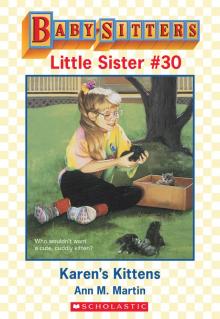 Karen's Kittens
Karen's Kittens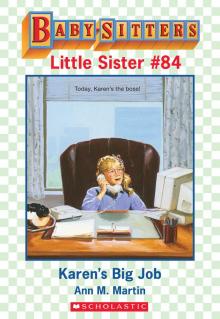 Karen's Big Job
Karen's Big Job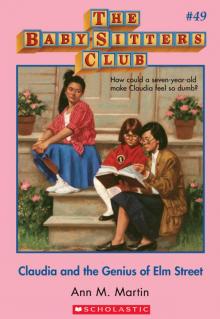 Claudia and the Genius of Elm Street
Claudia and the Genius of Elm Street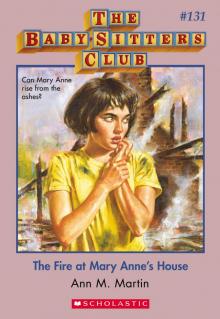 The Fire at Mary Anne's House
The Fire at Mary Anne's House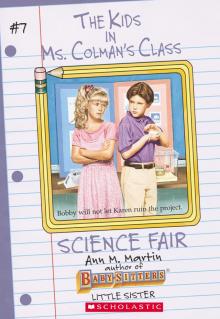 Science Fair
Science Fair Me and Katie (The Pest)
Me and Katie (The Pest)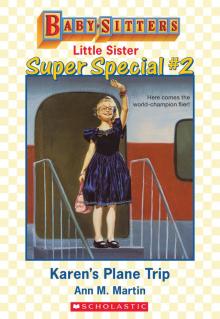 Karen's Plane Trip
Karen's Plane Trip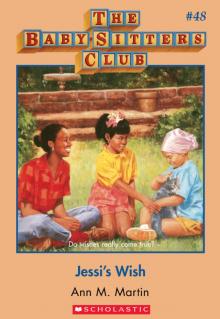 Jessi's Wish
Jessi's Wish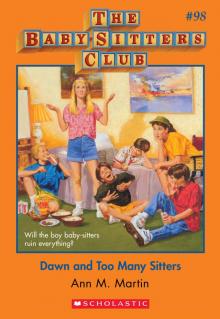 Dawn and Too Many Sitters
Dawn and Too Many Sitters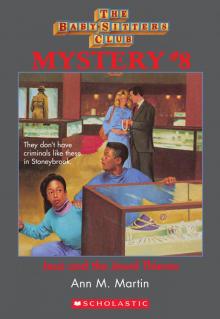 Jessi and the Jewel Thieves
Jessi and the Jewel Thieves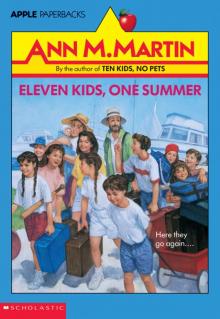 Eleven Kids, One Summer
Eleven Kids, One Summer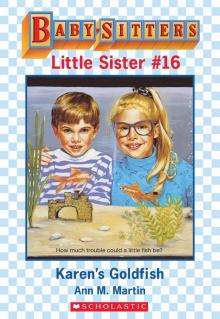 Karen's Goldfish
Karen's Goldfish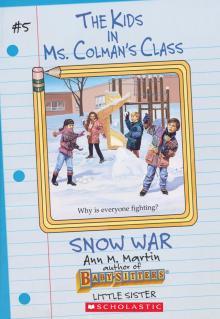 Snow War
Snow War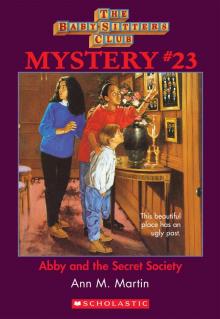 Abby and the Secret Society
Abby and the Secret Society Keeping Secrets
Keeping Secrets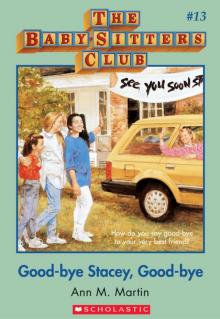 Good-Bye Stacey, Good-Bye
Good-Bye Stacey, Good-Bye Karen's Sleepover
Karen's Sleepover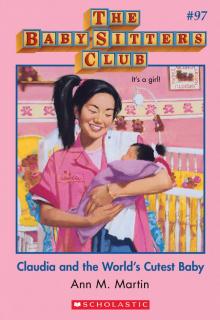 Claudia and the World's Cutest Baby
Claudia and the World's Cutest Baby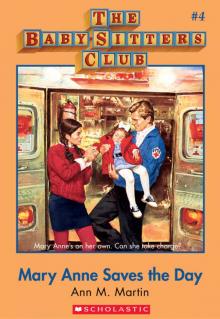 Mary Anne Saves the Day
Mary Anne Saves the Day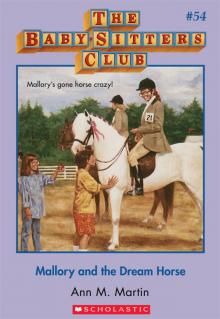 Mallory and the Dream Horse
Mallory and the Dream Horse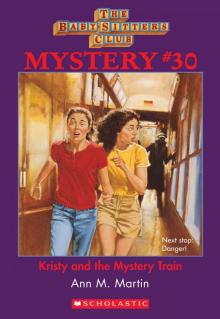 Kristy and the Mystery Train
Kristy and the Mystery Train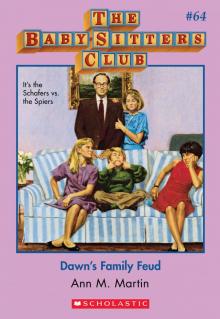 Dawn's Family Feud
Dawn's Family Feud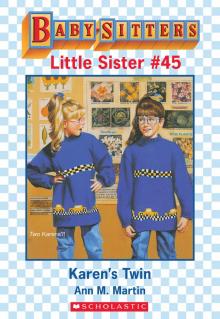 Karen's Twin
Karen's Twin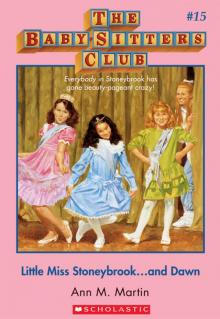 Little Miss Stoneybrook... And Dawn
Little Miss Stoneybrook... And Dawn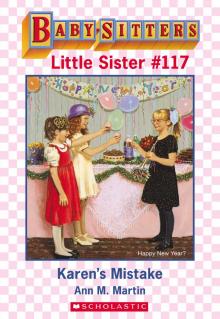 Karen's Mistake
Karen's Mistake Karen's Movie Star
Karen's Movie Star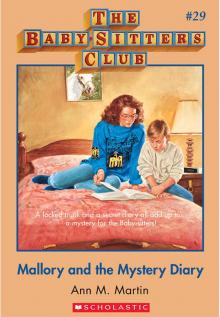 Mallory and the Mystery Diary
Mallory and the Mystery Diary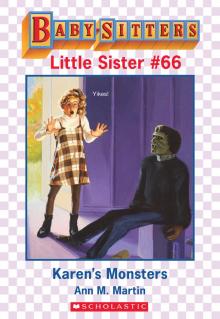 Karen's Monsters
Karen's Monsters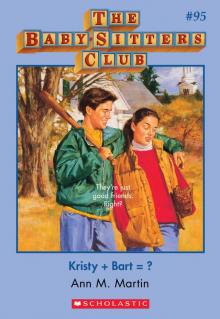 Kristy + Bart = ?
Kristy + Bart = ?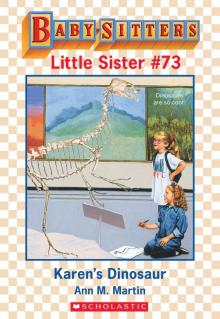 Karen's Dinosaur
Karen's Dinosaur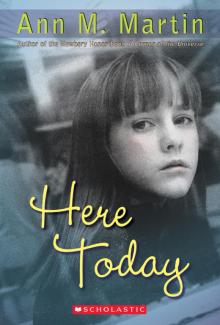 Here Today
Here Today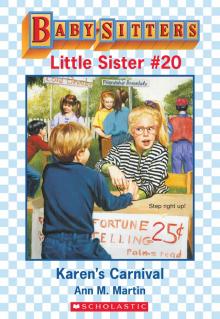 Karen's Carnival
Karen's Carnival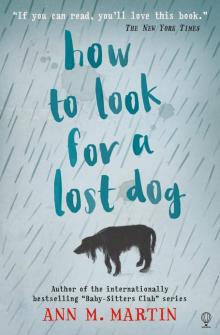 How to Look for a Lost Dog
How to Look for a Lost Dog Stacey vs. Claudia
Stacey vs. Claudia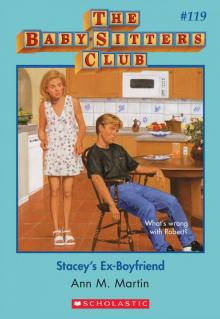 Stacey's Ex-Boyfriend
Stacey's Ex-Boyfriend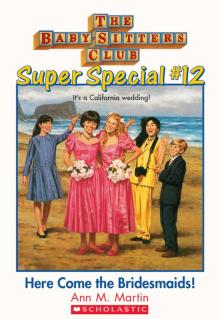 Here Come the Bridesmaids!
Here Come the Bridesmaids! Graduation Day
Graduation Day Kristy's Big News
Kristy's Big News Karen's School Surprise
Karen's School Surprise Kristy Thomas, Dog Trainer
Kristy Thomas, Dog Trainer Baby-Sitters' Christmas Chiller
Baby-Sitters' Christmas Chiller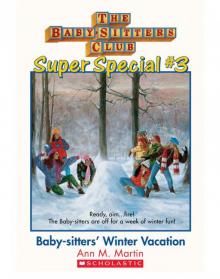 Baby-Sitters' Winter Vacation
Baby-Sitters' Winter Vacation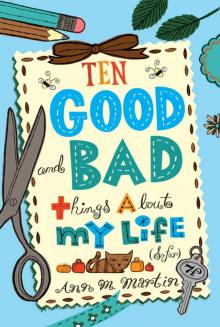 Ten Good and Bad Things About My Life
Ten Good and Bad Things About My Life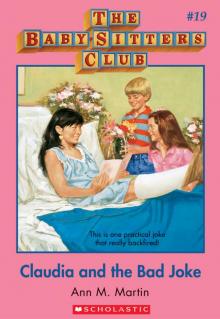 Claudia and the Bad Joke
Claudia and the Bad Joke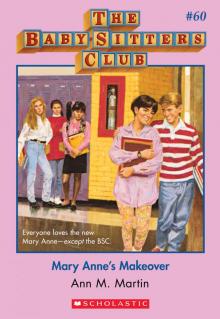 Mary Anne's Makeover
Mary Anne's Makeover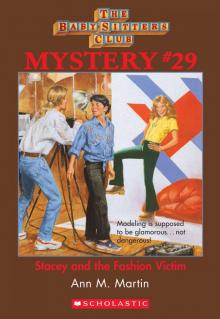 Stacey and the Fashion Victim
Stacey and the Fashion Victim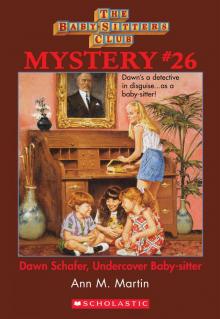 Dawn Schafer, Undercover Baby-Sitter
Dawn Schafer, Undercover Baby-Sitter Karen's Tuba
Karen's Tuba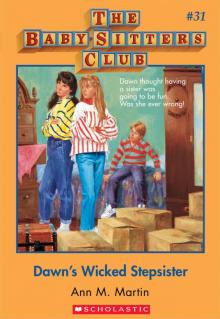 Dawn's Wicked Stepsister
Dawn's Wicked Stepsister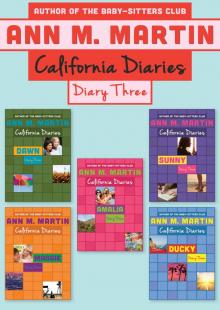 Diary Three: Dawn, Sunny, Maggie, Amalia, and Ducky
Diary Three: Dawn, Sunny, Maggie, Amalia, and Ducky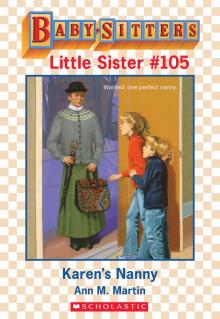 Karen's Nanny
Karen's Nanny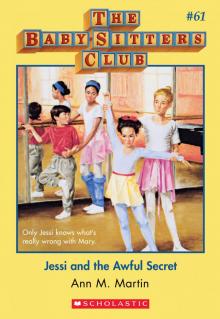 Jessi and the Awful Secret
Jessi and the Awful Secret Karen's New Year
Karen's New Year Karen's Candy
Karen's Candy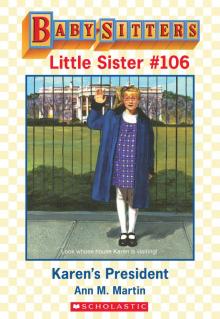 Karen's President
Karen's President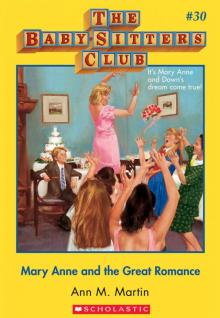 Mary Anne and the Great Romance
Mary Anne and the Great Romance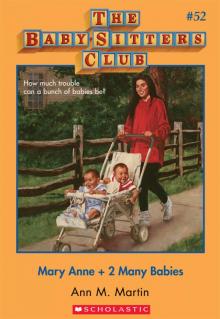 Mary Anne + 2 Many Babies
Mary Anne + 2 Many Babies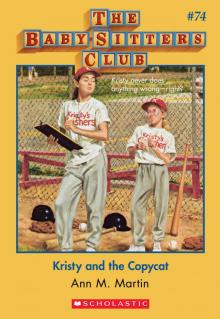 Kristy and the Copycat
Kristy and the Copycat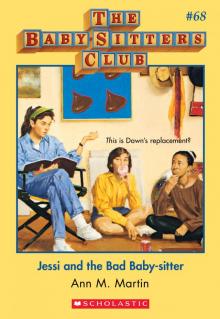 Jessi and the Bad Baby-Sitter
Jessi and the Bad Baby-Sitter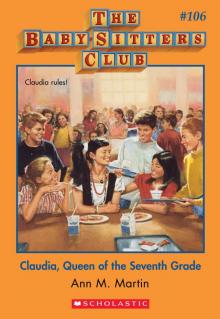 Claudia, Queen of the Seventh Grade
Claudia, Queen of the Seventh Grade Claudia and the Lighthouse Ghost
Claudia and the Lighthouse Ghost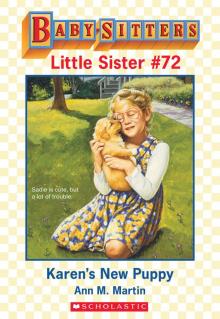 Karen's New Puppy
Karen's New Puppy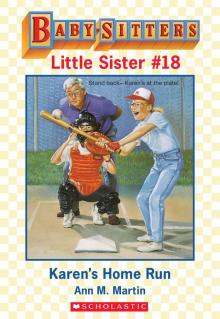 Karen's Home Run
Karen's Home Run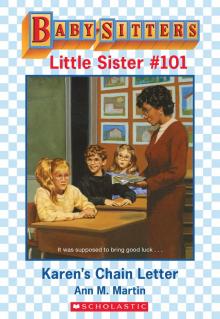 Karen's Chain Letter
Karen's Chain Letter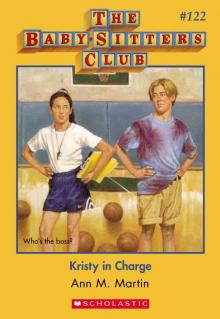 Kristy in Charge
Kristy in Charge Karen's Angel
Karen's Angel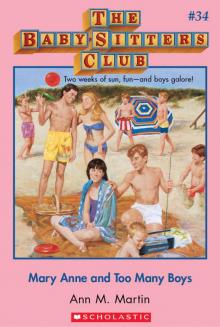 Mary Anne and Too Many Boys
Mary Anne and Too Many Boys Karen's Big Fight
Karen's Big Fight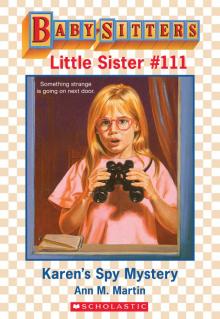 Karen's Spy Mystery
Karen's Spy Mystery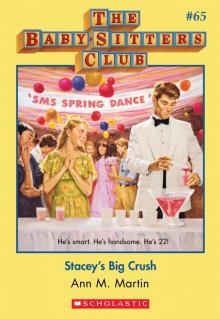 Stacey's Big Crush
Stacey's Big Crush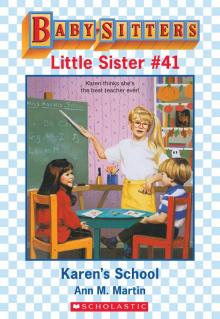 Karen's School
Karen's School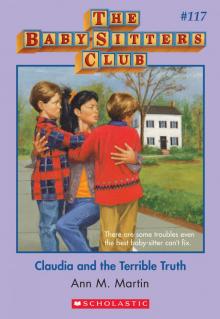 Claudia and the Terrible Truth
Claudia and the Terrible Truth Karen's Cowboy
Karen's Cowboy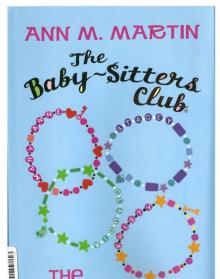 The Summer Before
The Summer Before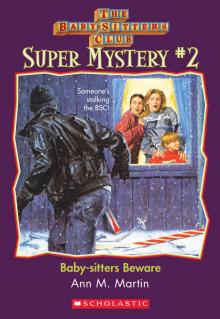 Beware, Dawn!
Beware, Dawn! Belle Teale
Belle Teale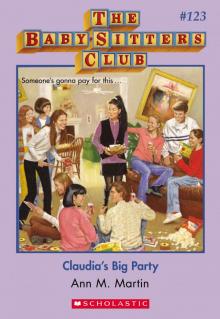 Claudia's Big Party
Claudia's Big Party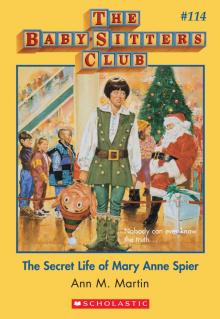 The Secret Life of Mary Anne Spier
The Secret Life of Mary Anne Spier Karen's Book
Karen's Book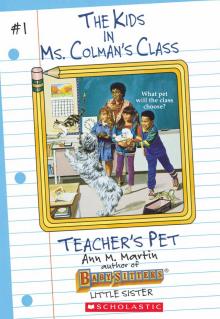 Teacher's Pet
Teacher's Pet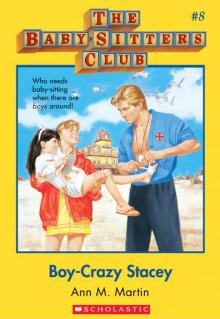 Boy-Crazy Stacey
Boy-Crazy Stacey Claudia and the Disaster Date
Claudia and the Disaster Date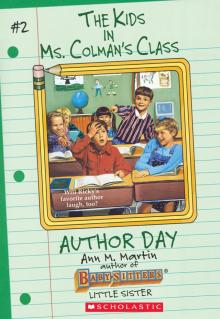 Author Day
Author Day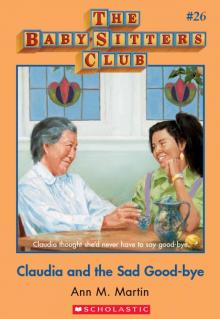 Claudia and the Sad Good-Bye
Claudia and the Sad Good-Bye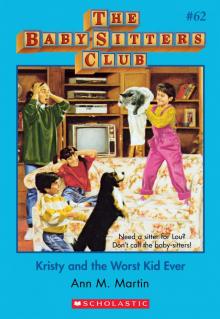 Kristy and the Worst Kid Ever
Kristy and the Worst Kid Ever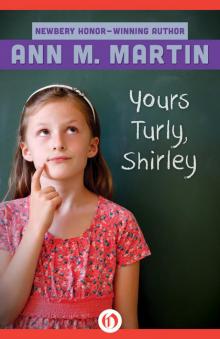 Yours Turly, Shirley
Yours Turly, Shirley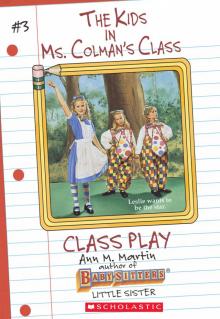 Class Play
Class Play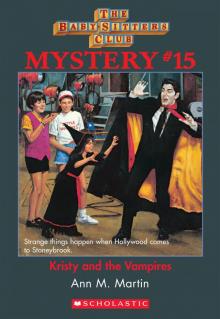 Kristy and the Vampires
Kristy and the Vampires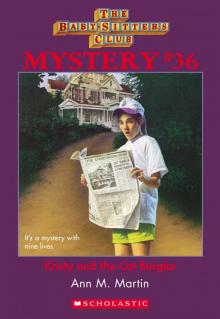 Kristy and the Cat Burglar
Kristy and the Cat Burglar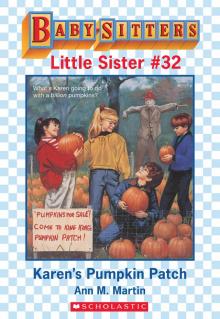 Karen's Pumpkin Patch
Karen's Pumpkin Patch Stacey and the Mystery at the Empty House
Stacey and the Mystery at the Empty House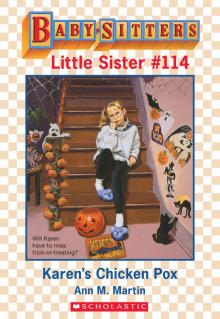 Karen's Chicken Pox
Karen's Chicken Pox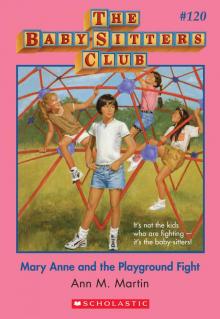 Mary Anne and the Playground Fight
Mary Anne and the Playground Fight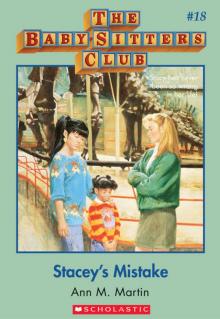 Stacey's Mistake
Stacey's Mistake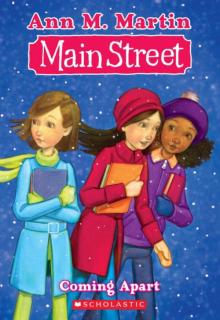 Coming Apart
Coming Apart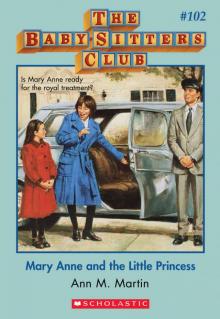 Mary Anne and the Little Princess
Mary Anne and the Little Princess Karen, Hannie and Nancy: The Three Musketeers
Karen, Hannie and Nancy: The Three Musketeers 'Tis the Season
'Tis the Season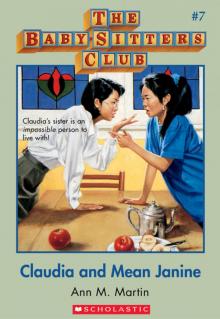 Claudia and Mean Janine
Claudia and Mean Janine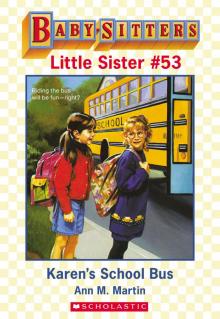 Karen's School Bus
Karen's School Bus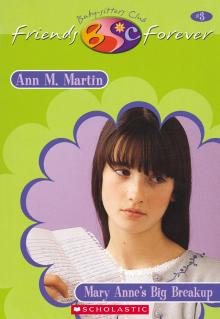 Mary Anne's Big Breakup
Mary Anne's Big Breakup Rain Reign
Rain Reign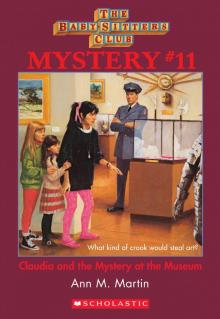 Claudia and the Mystery at the Museum
Claudia and the Mystery at the Museum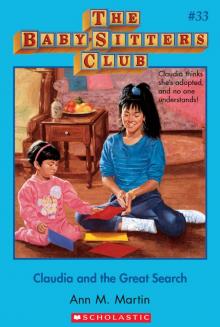 Claudia and the Great Search
Claudia and the Great Search Karen's Doll
Karen's Doll Shannon's Story
Shannon's Story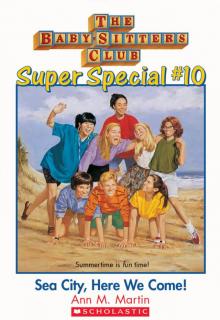 Sea City, Here We Come!
Sea City, Here We Come!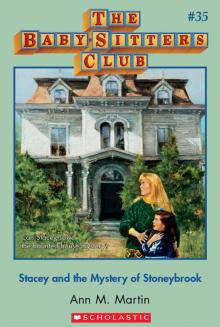 Stacey and the Mystery of Stoneybrook
Stacey and the Mystery of Stoneybrook Karen's Treasure
Karen's Treasure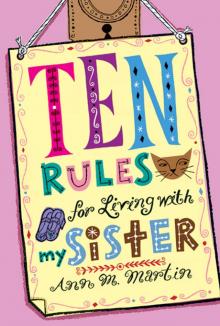 Ten Rules for Living With My Sister
Ten Rules for Living With My Sister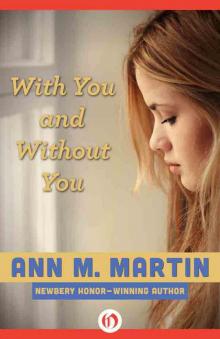 With You and Without You
With You and Without You Baby-Sitters' Island Adventure
Baby-Sitters' Island Adventure Karen's Fishing Trip
Karen's Fishing Trip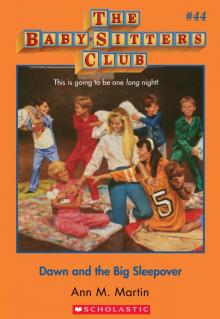 Dawn and the Big Sleepover
Dawn and the Big Sleepover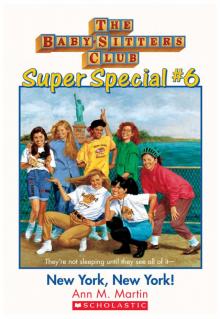 New York, New York!
New York, New York!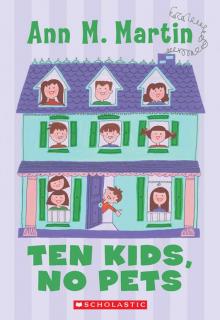 Ten Kids, No Pets
Ten Kids, No Pets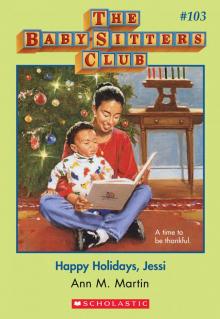 Happy Holidays, Jessi
Happy Holidays, Jessi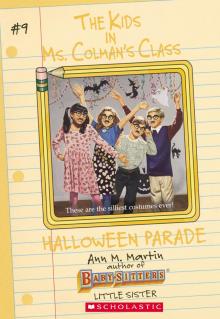 Halloween Parade
Halloween Parade Karen's New Holiday
Karen's New Holiday Kristy Power!
Kristy Power! Karen's Wish
Karen's Wish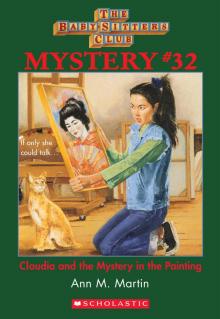 Claudia and the Mystery in the Painting
Claudia and the Mystery in the Painting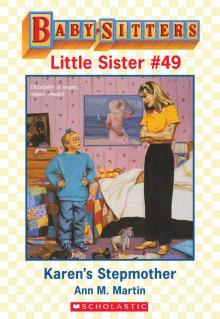 Karen's Stepmother
Karen's Stepmother Abby in Wonderland
Abby in Wonderland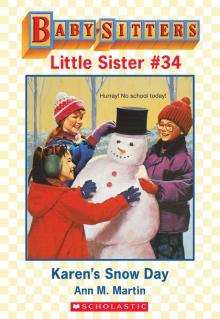 Karen's Snow Day
Karen's Snow Day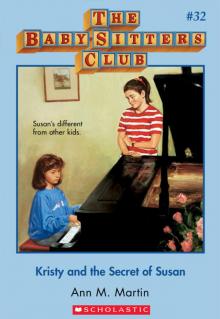 Kristy and the Secret of Susan
Kristy and the Secret of Susan Karen's Pony Camp
Karen's Pony Camp Karen's School Trip
Karen's School Trip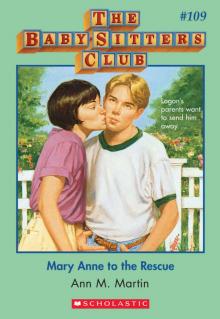 Mary Anne to the Rescue
Mary Anne to the Rescue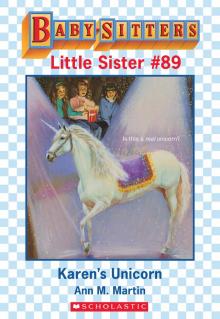 Karen's Unicorn
Karen's Unicorn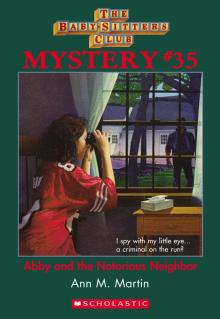 Abby and the Notorious Neighbor
Abby and the Notorious Neighbor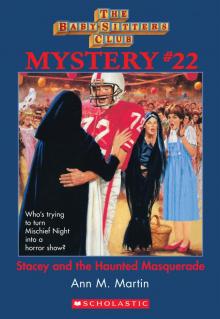 Stacey and the Haunted Masquerade
Stacey and the Haunted Masquerade Claudia Gets Her Guy
Claudia Gets Her Guy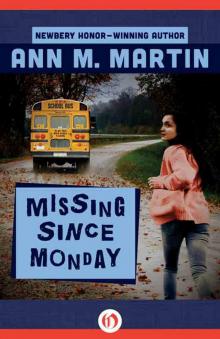 Missing Since Monday
Missing Since Monday Stacey's Choice
Stacey's Choice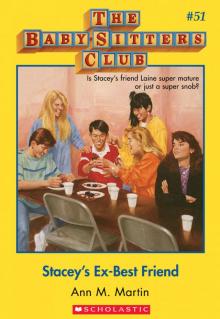 Stacey's Ex-Best Friend
Stacey's Ex-Best Friend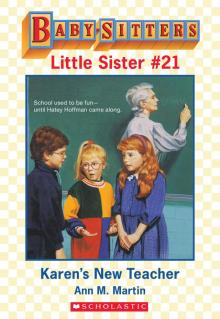 Karen's New Teacher
Karen's New Teacher Karen's Accident
Karen's Accident Karen's Lucky Penny
Karen's Lucky Penny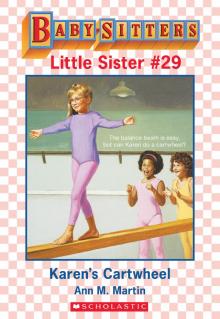 Karen's Cartwheel
Karen's Cartwheel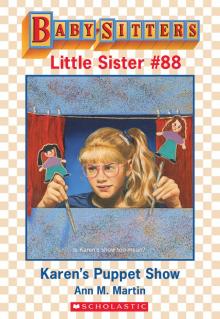 Karen's Puppet Show
Karen's Puppet Show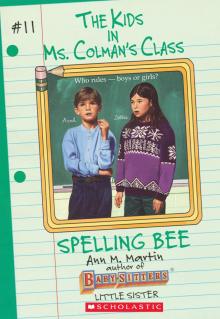 Spelling Bee
Spelling Bee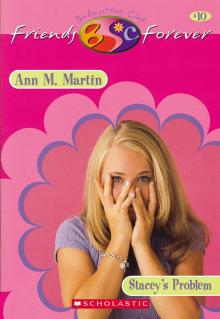 Stacey's Problem
Stacey's Problem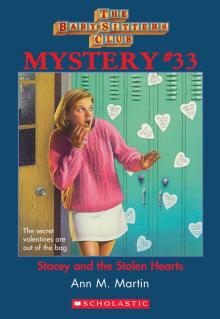 Stacey and the Stolen Hearts
Stacey and the Stolen Hearts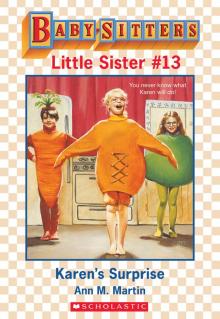 Karen's Surprise
Karen's Surprise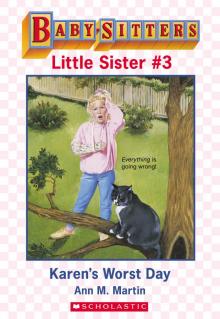 Karen's Worst Day
Karen's Worst Day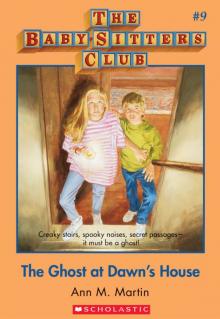 The Ghost at Dawn's House
The Ghost at Dawn's House Karen's Big Sister
Karen's Big Sister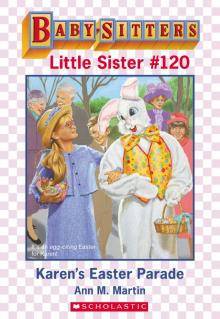 Karen's Easter Parade
Karen's Easter Parade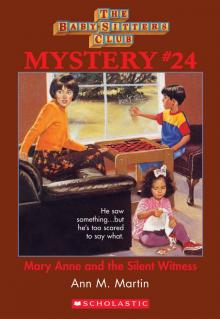 Mary Anne and the Silent Witness
Mary Anne and the Silent Witness Karen's Swim Meet
Karen's Swim Meet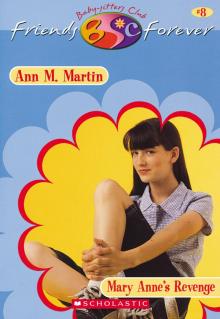 Mary Anne's Revenge
Mary Anne's Revenge Karen's Mystery
Karen's Mystery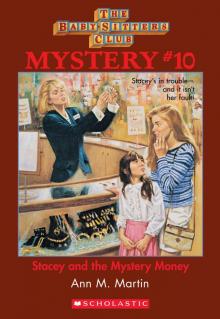 Stacey and the Mystery Money
Stacey and the Mystery Money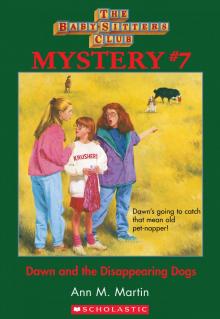 Dawn and the Disappearing Dogs
Dawn and the Disappearing Dogs Karen's Christmas Tree
Karen's Christmas Tree Welcome to Camden Falls
Welcome to Camden Falls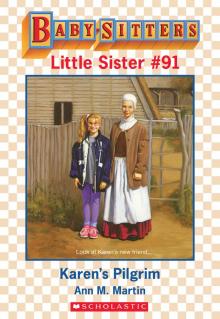 Karen's Pilgrim
Karen's Pilgrim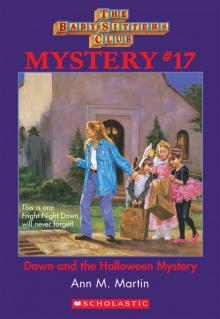 Dawn and the Halloween Mystery
Dawn and the Halloween Mystery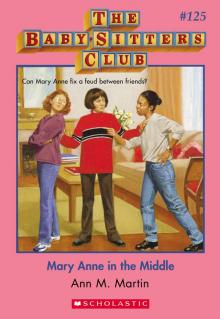 Mary Anne in the Middle
Mary Anne in the Middle Karen's Toys
Karen's Toys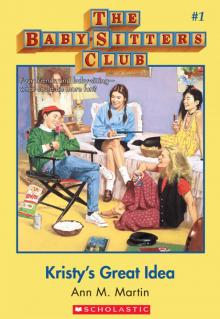 Kristy's Great Idea
Kristy's Great Idea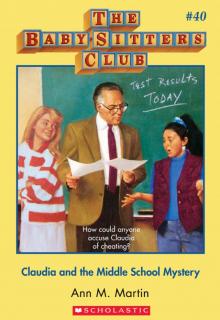 Claudia and the Middle School Mystery
Claudia and the Middle School Mystery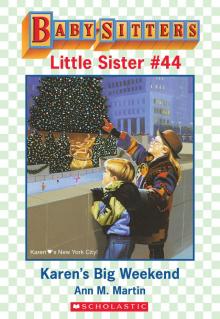 Karen's Big Weekend
Karen's Big Weekend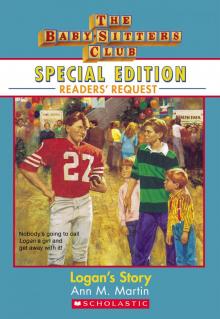 Logan's Story
Logan's Story Karen's Yo-Yo
Karen's Yo-Yo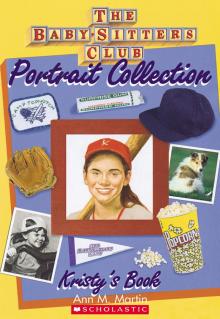 Kristy's Book
Kristy's Book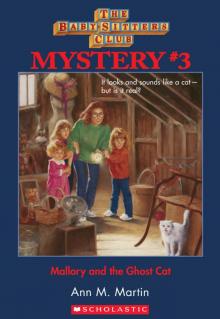 Mallory and the Ghost Cat
Mallory and the Ghost Cat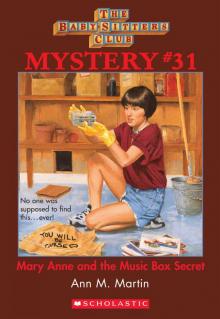 Mary Anne and the Music
Mary Anne and the Music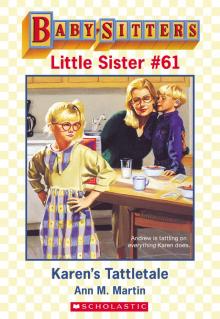 Karen's Tattletale
Karen's Tattletale Karen's County Fair
Karen's County Fair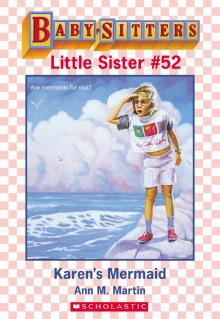 Karen's Mermaid
Karen's Mermaid Snowbound
Snowbound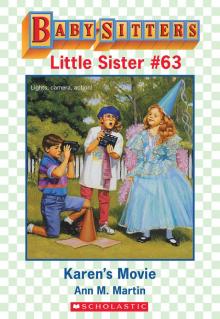 Karen's Movie
Karen's Movie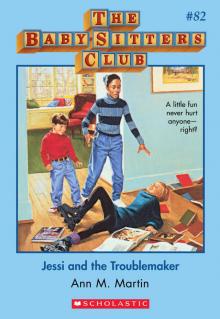 Jessi and the Troublemaker
Jessi and the Troublemaker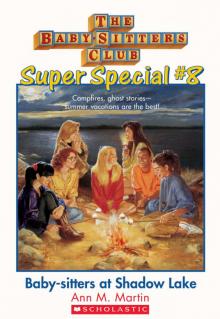 Baby-Sitters at Shadow Lake
Baby-Sitters at Shadow Lake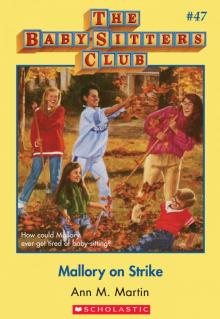 Mallory on Strike
Mallory on Strike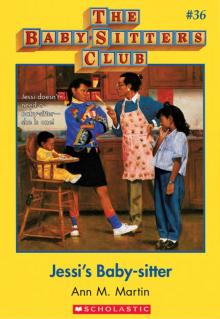 Jessi's Baby-Sitter
Jessi's Baby-Sitter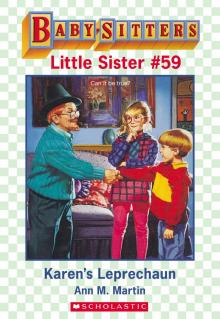 Karen's Leprechaun
Karen's Leprechaun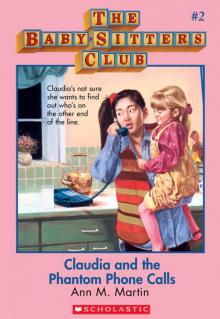 Claudia and the Phantom Phone Calls
Claudia and the Phantom Phone Calls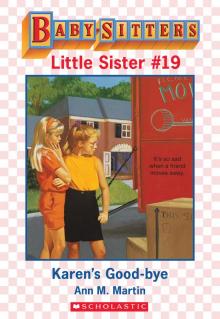 Karen's Good-Bye
Karen's Good-Bye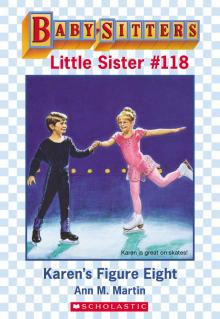 Karen's Figure Eight
Karen's Figure Eight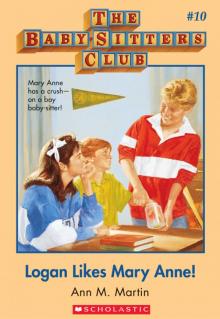 Logan Likes Mary Anne!
Logan Likes Mary Anne!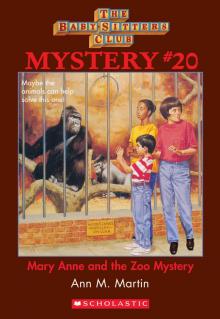 Mary Anne and the Zoo Mystery
Mary Anne and the Zoo Mystery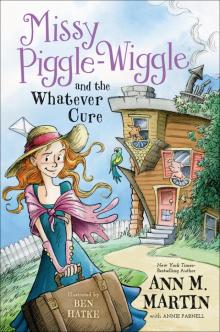 Missy Piggle-Wiggle and the Whatever Cure
Missy Piggle-Wiggle and the Whatever Cure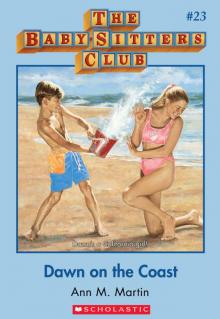 Dawn on the Coast
Dawn on the Coast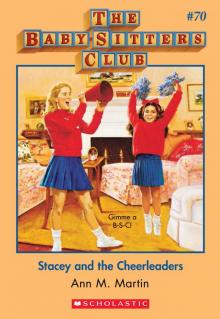 Stacey and the Cheerleaders
Stacey and the Cheerleaders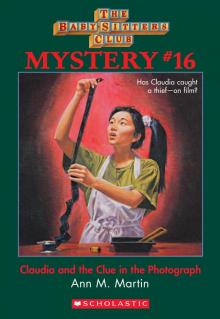 Claudia and the Clue in the Photograph
Claudia and the Clue in the Photograph Karen's New Friend
Karen's New Friend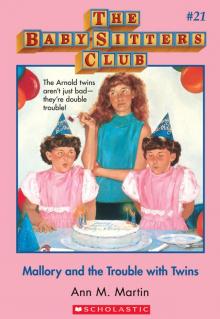 Mallory and the Trouble With Twins
Mallory and the Trouble With Twins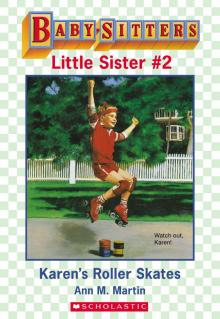 Karen's Roller Skates
Karen's Roller Skates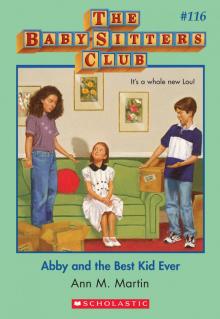 Abby and the Best Kid Ever
Abby and the Best Kid Ever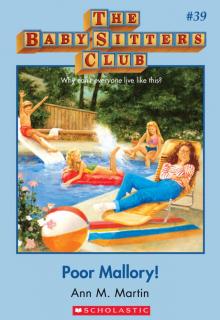 Poor Mallory!
Poor Mallory! Karen's Witch
Karen's Witch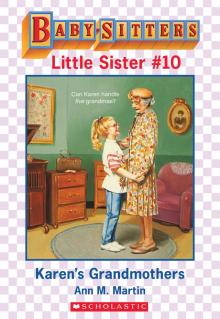 Karen's Grandmothers
Karen's Grandmothers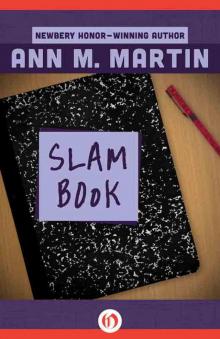 Slam Book
Slam Book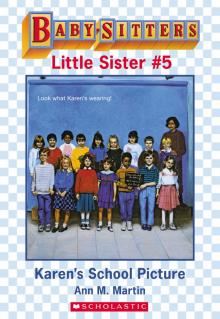 Karen's School Picture
Karen's School Picture Karen's Reindeer
Karen's Reindeer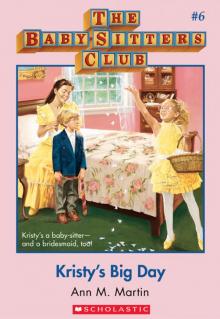 Kristy's Big Day
Kristy's Big Day The Long Way Home
The Long Way Home Karen's Sleigh Ride
Karen's Sleigh Ride On Christmas Eve
On Christmas Eve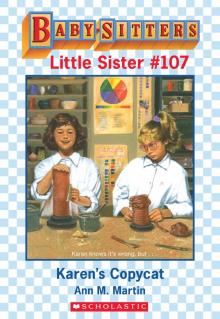 Karen's Copycat
Karen's Copycat Karen's Ice Skates
Karen's Ice Skates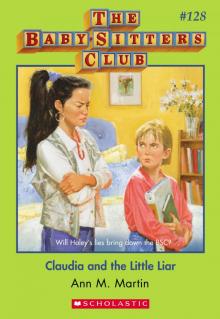 Claudia and the Little Liar
Claudia and the Little Liar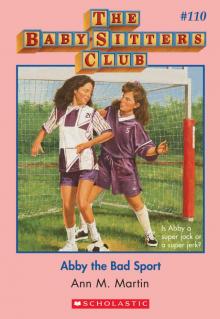 Abby the Bad Sport
Abby the Bad Sport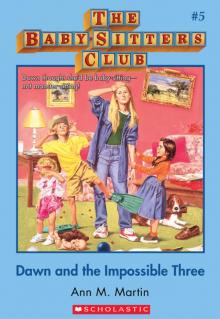 The Baby-Sitters Club #5: Dawn and the Impossible Three
The Baby-Sitters Club #5: Dawn and the Impossible Three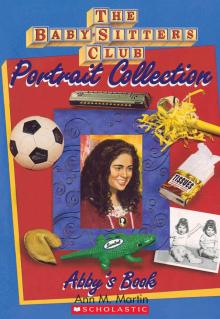 Abby's Book
Abby's Book Karen's Big Top
Karen's Big Top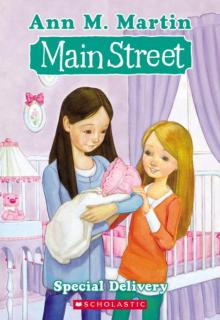 Main Street #8: Special Delivery
Main Street #8: Special Delivery Kristy and the Kidnapper
Kristy and the Kidnapper Karen's Ski Trip
Karen's Ski Trip Karen's Hurricane
Karen's Hurricane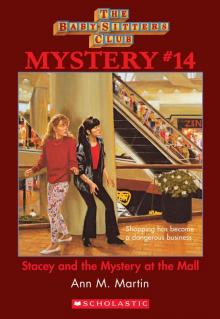 Stacey and the Mystery at the Mall
Stacey and the Mystery at the Mall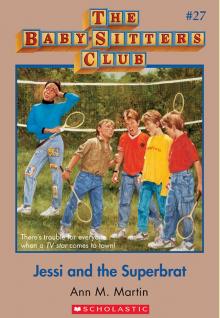 Jessi and the Superbrat
Jessi and the Superbrat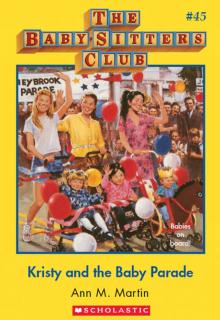 Kristy and the Baby Parade
Kristy and the Baby Parade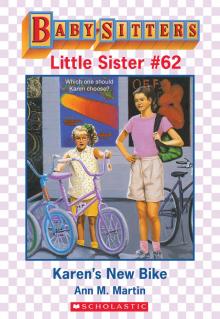 Karen's New Bike
Karen's New Bike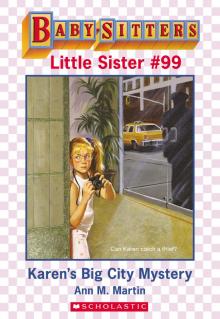 Karen's Big City Mystery
Karen's Big City Mystery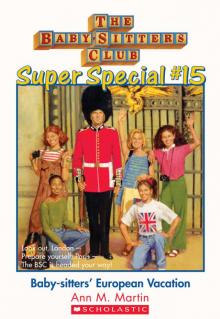 Baby-Sitters' European Vacation
Baby-Sitters' European Vacation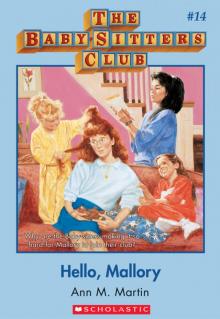 Hello, Mallory
Hello, Mallory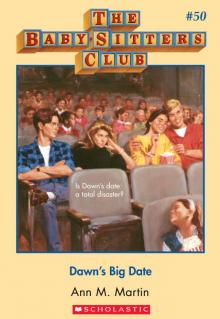 Dawn's Big Date
Dawn's Big Date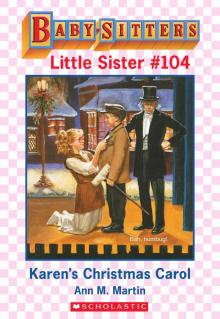 Karen's Christmas Carol
Karen's Christmas Carol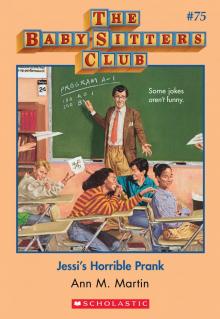 Jessi's Horrible Prank
Jessi's Horrible Prank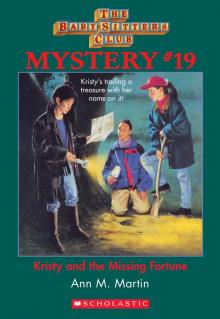 Kristy and the Missing Fortune
Kristy and the Missing Fortune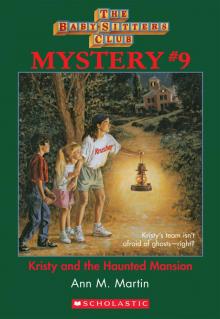 Kristy and the Haunted Mansion
Kristy and the Haunted Mansion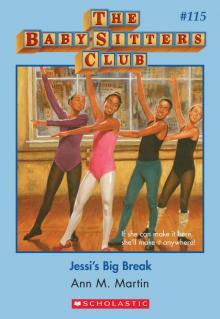 Jessi's Big Break
Jessi's Big Break Karen's Pony
Karen's Pony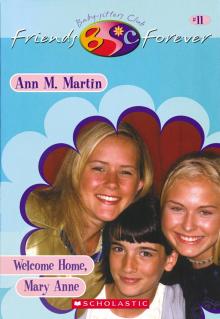 Welcome Home, Mary Anne
Welcome Home, Mary Anne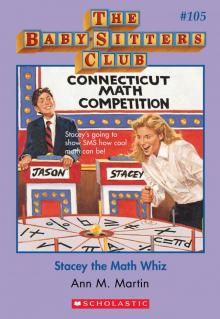 Stacey the Math Whiz
Stacey the Math Whiz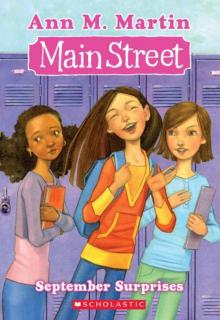 September Surprises
September Surprises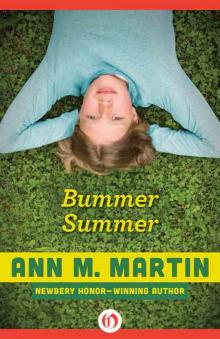 Bummer Summer
Bummer Summer Karen's Secret
Karen's Secret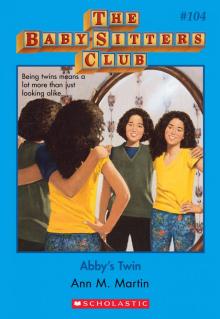 Abby's Twin
Abby's Twin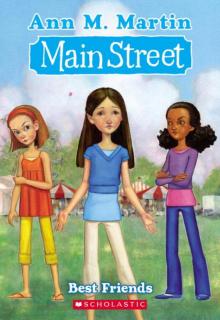 Main Street #4: Best Friends
Main Street #4: Best Friends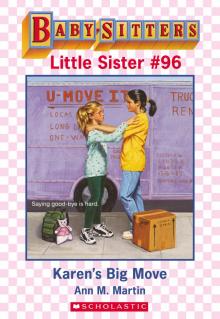 Karen's Big Move
Karen's Big Move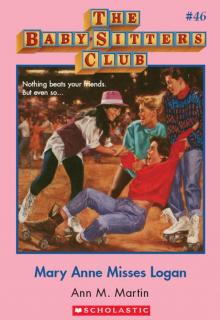 Mary Anne Misses Logan
Mary Anne Misses Logan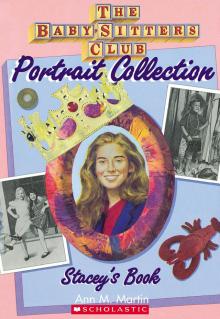 Stacey's Book
Stacey's Book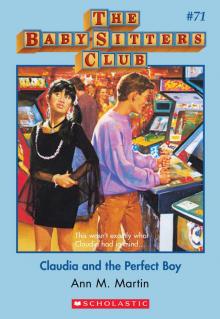 Claudia and the Perfect Boy
Claudia and the Perfect Boy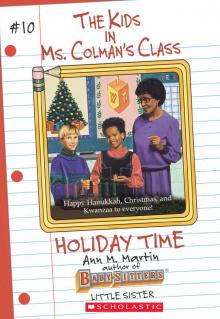 Holiday Time
Holiday Time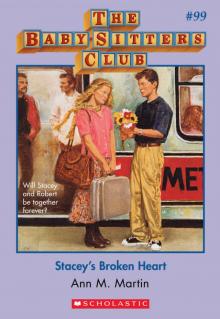 Stacey's Broken Heart
Stacey's Broken Heart Karen's Field Day
Karen's Field Day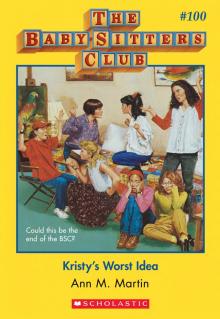 Kristy's Worst Idea
Kristy's Worst Idea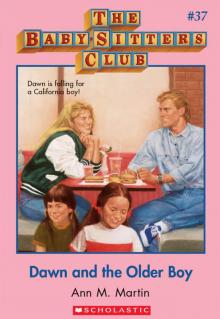 Dawn and the Older Boy
Dawn and the Older Boy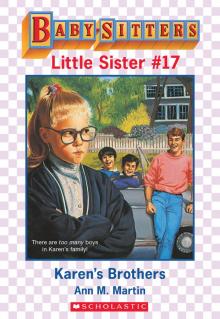 Karen's Brothers
Karen's Brothers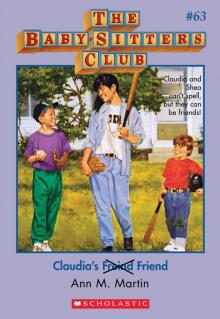 Claudia's Friend
Claudia's Friend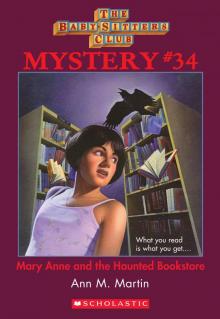 Mary Anne and the Haunted Bookstore
Mary Anne and the Haunted Bookstore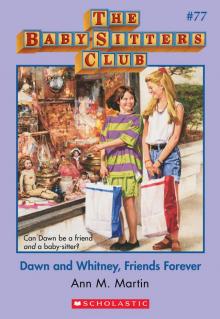 Dawn and Whitney, Friends Forever
Dawn and Whitney, Friends Forever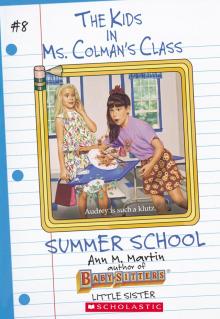 Summer School
Summer School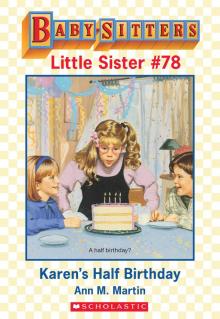 Karen's Birthday
Karen's Birthday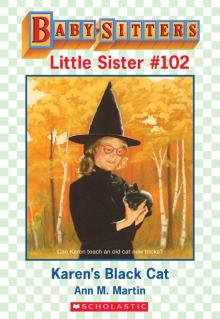 Karen's Black Cat
Karen's Black Cat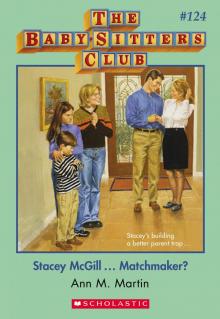 Stacey McGill... Matchmaker?
Stacey McGill... Matchmaker?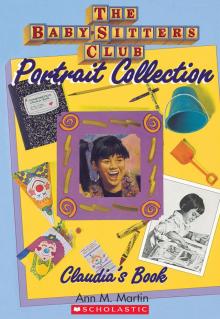 Claudia's Book
Claudia's Book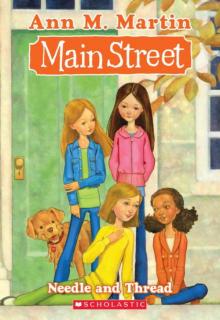 Main Street #2: Needle and Thread
Main Street #2: Needle and Thread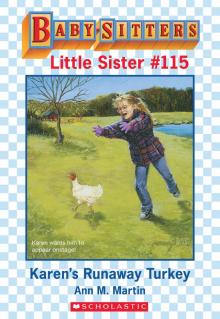 Karen's Runaway Turkey
Karen's Runaway Turkey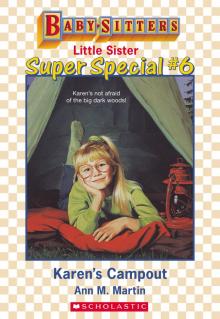 Karen's Campout
Karen's Campout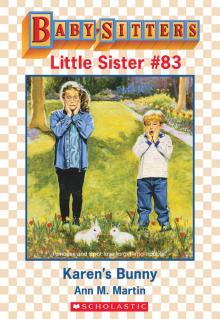 Karen's Bunny
Karen's Bunny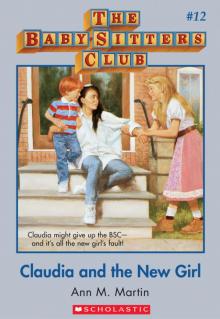 Claudia and the New Girl
Claudia and the New Girl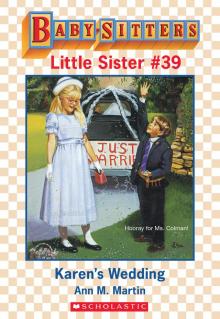 Karen's Wedding
Karen's Wedding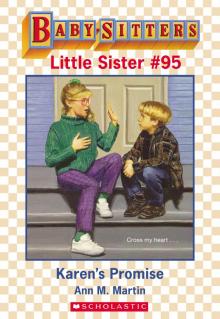 Karen's Promise
Karen's Promise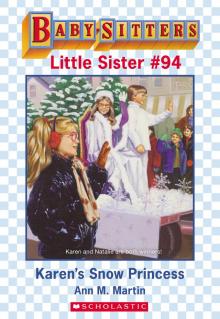 Karen's Snow Princess
Karen's Snow Princess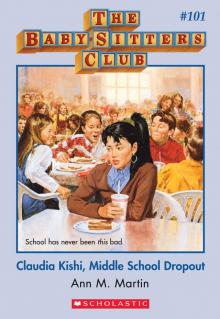 Claudia Kishi, Middle School Dropout
Claudia Kishi, Middle School Dropout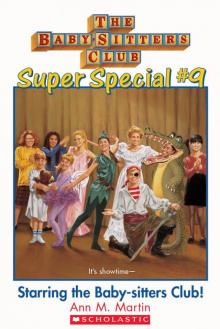 Starring the Baby-Sitters Club!
Starring the Baby-Sitters Club!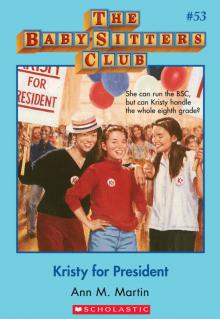 Kristy for President
Kristy for President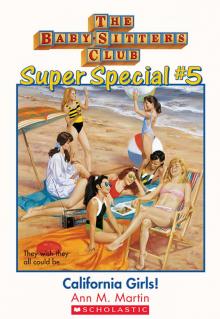 California Girls!
California Girls!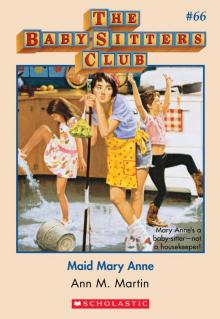 Maid Mary Anne
Maid Mary Anne Abby's Un-Valentine
Abby's Un-Valentine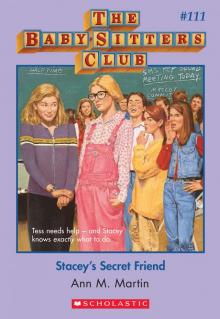 Stacey's Secret Friend
Stacey's Secret Friend Karen's Haunted House
Karen's Haunted House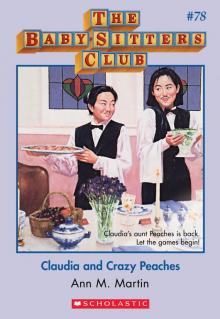 Claudia and Crazy Peaches
Claudia and Crazy Peaches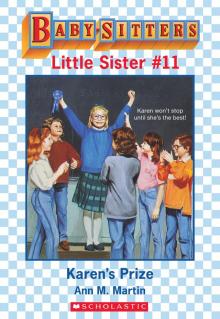 Karen's Prize
Karen's Prize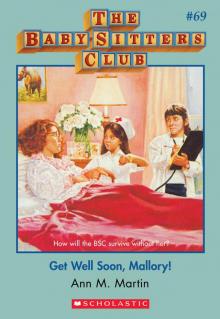 Get Well Soon, Mallory!
Get Well Soon, Mallory!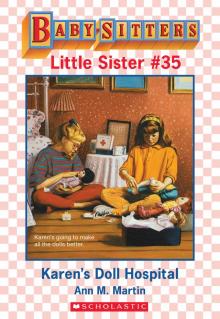 Karen's Doll Hospital
Karen's Doll Hospital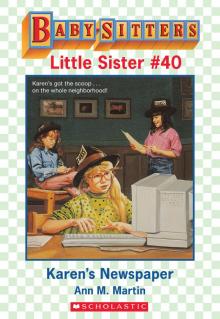 Karen's Newspaper
Karen's Newspaper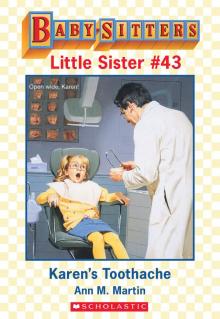 Karen's Toothache
Karen's Toothache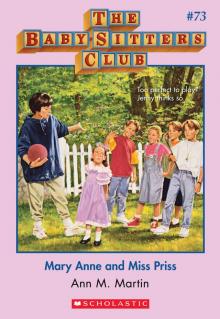 Mary Anne and Miss Priss
Mary Anne and Miss Priss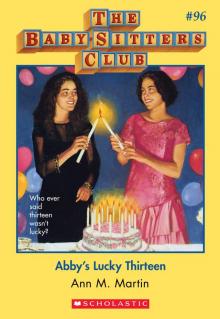 Abby's Lucky Thirteen
Abby's Lucky Thirteen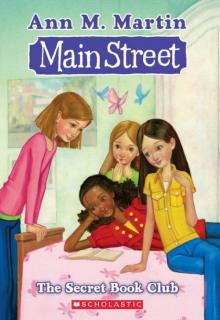 The Secret Book Club
The Secret Book Club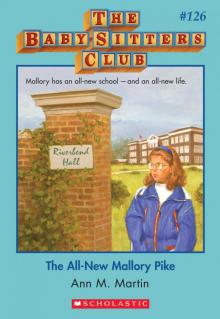 The All-New Mallory Pike
The All-New Mallory Pike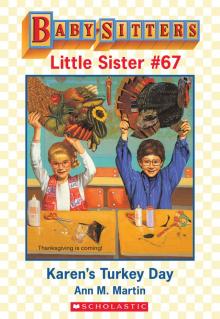 Karen's Turkey Day
Karen's Turkey Day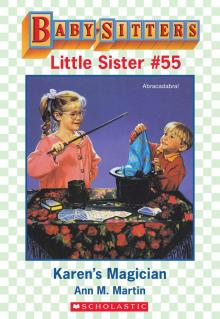 Karen's Magician
Karen's Magician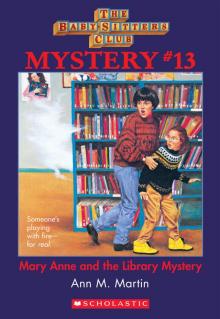 Mary Anne and the Library Mystery
Mary Anne and the Library Mystery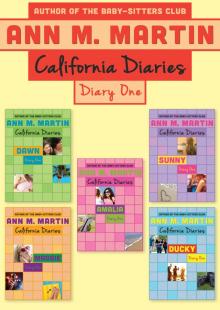 Diary One: Dawn, Sunny, Maggie, Amalia, and Ducky
Diary One: Dawn, Sunny, Maggie, Amalia, and Ducky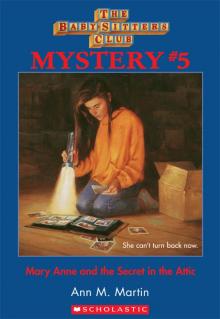 Mary Anne and the Secret in the Attic
Mary Anne and the Secret in the Attic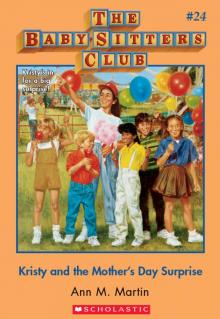 Kristy and the Mother's Day Surprise
Kristy and the Mother's Day Surprise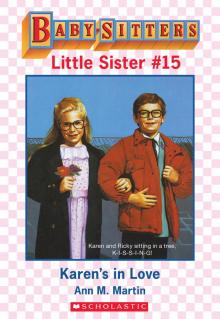 Karen's in Love
Karen's in Love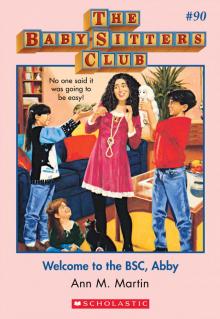 Welcome to the BSC, Abby
Welcome to the BSC, Abby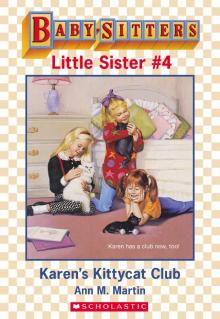 Karen's Kittycat Club
Karen's Kittycat Club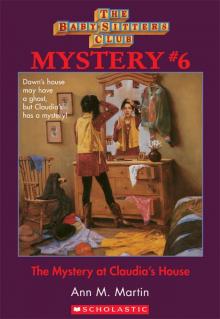 The Mystery at Claudia's House
The Mystery at Claudia's House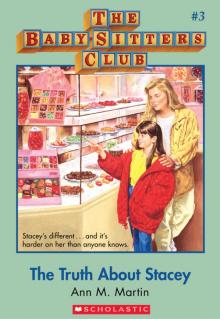 The Truth About Stacey
The Truth About Stacey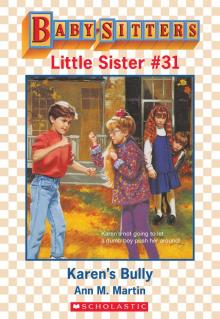 Karen's Bully
Karen's Bully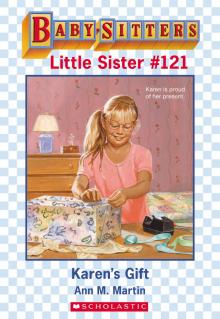 Karen's Gift
Karen's Gift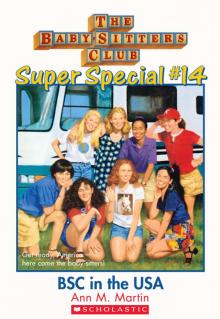 BSC in the USA
BSC in the USA Everything for a Dog
Everything for a Dog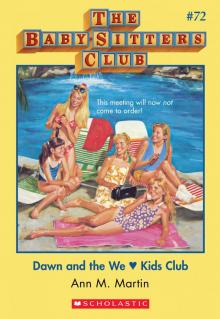 Dawn and the We Love Kids Club
Dawn and the We Love Kids Club Karen's Ghost
Karen's Ghost Stacey's Lie
Stacey's Lie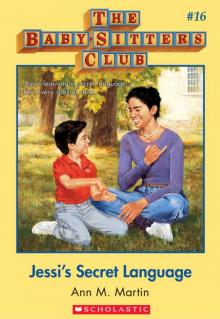 Jessi's Secret Language
Jessi's Secret Language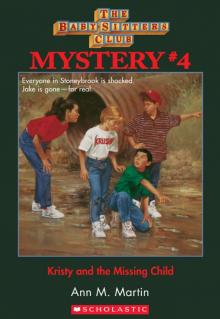 Kristy and the Missing Child
Kristy and the Missing Child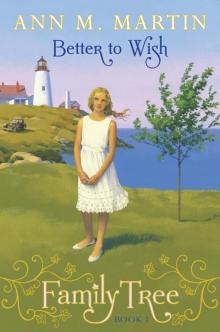 Better to Wish
Better to Wish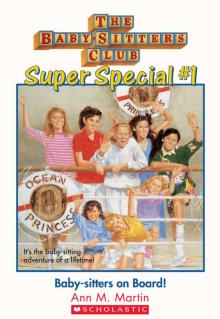 Baby-Sitters on Board!
Baby-Sitters on Board!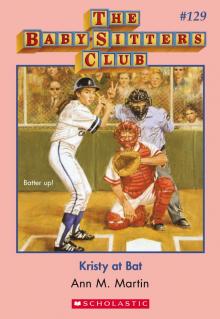 Kristy at Bat
Kristy at Bat Everything Changes
Everything Changes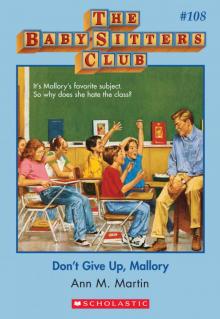 Don't Give Up, Mallory
Don't Give Up, Mallory A Dog's Life: The Autobiography of a Stray
A Dog's Life: The Autobiography of a Stray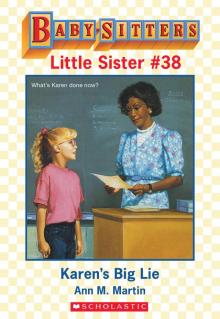 Karen's Big Lie
Karen's Big Lie Karen's Show and Share
Karen's Show and Share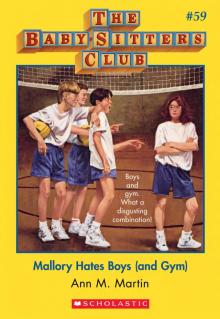 Mallory Hates Boys (and Gym)
Mallory Hates Boys (and Gym)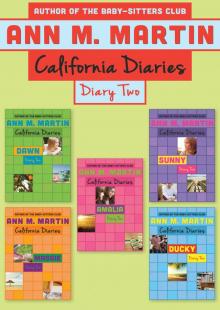 Diary Two: Dawn, Sunny, Maggie, Amalia, and Ducky
Diary Two: Dawn, Sunny, Maggie, Amalia, and Ducky Karen's Pen Pal
Karen's Pen Pal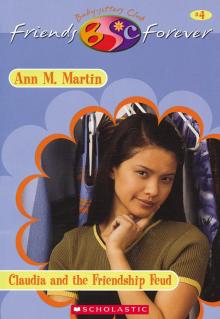 Claudia and the Friendship Feud
Claudia and the Friendship Feud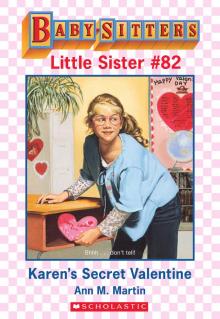 Karen's Secret Valentine
Karen's Secret Valentine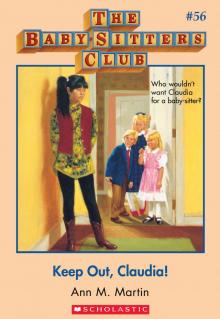 Keep Out, Claudia!
Keep Out, Claudia! Aloha, Baby-Sitters!
Aloha, Baby-Sitters!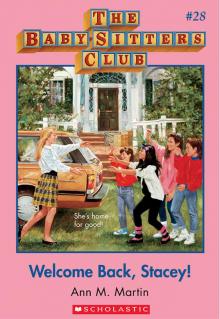 Welcome Back, Stacey
Welcome Back, Stacey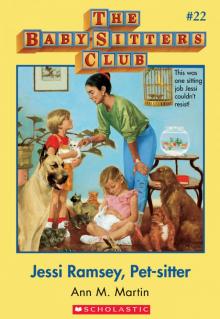 Jessi Ramsey, Pet-Sitter
Jessi Ramsey, Pet-Sitter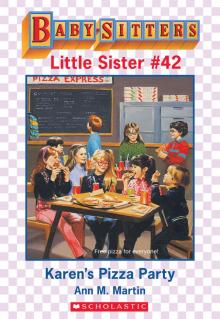 Karen's Pizza Party
Karen's Pizza Party Kristy and the Dirty Diapers
Kristy and the Dirty Diapers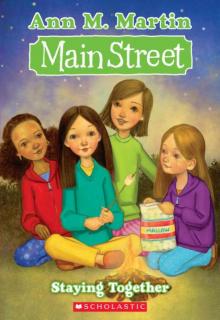 Staying Together
Staying Together Dawn and the Surfer Ghost
Dawn and the Surfer Ghost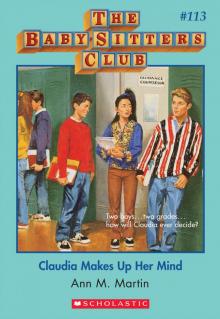 Claudia Makes Up Her Mind
Claudia Makes Up Her Mind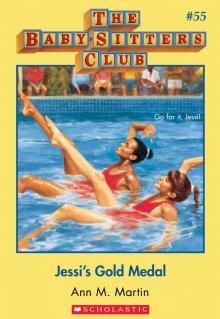 Jessi's Gold Medal
Jessi's Gold Medal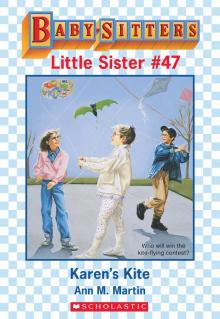 Karen's Kite
Karen's Kite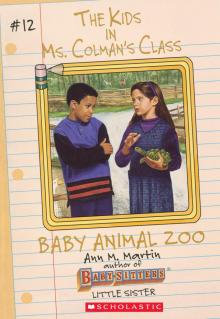 Baby Animal Zoo
Baby Animal Zoo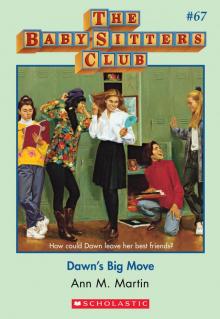 Dawn's Big Move
Dawn's Big Move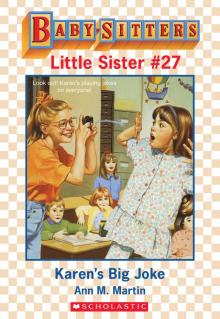 Karen's Big Joke
Karen's Big Joke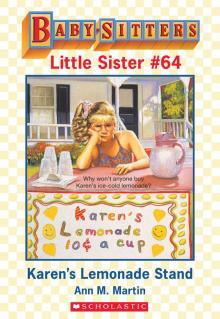 Karen's Lemonade Stand
Karen's Lemonade Stand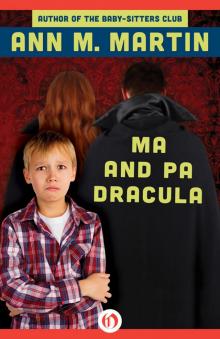 Ma and Pa Dracula
Ma and Pa Dracula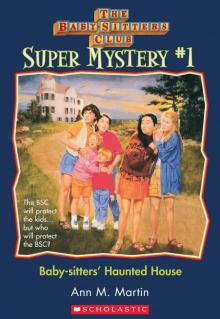 Baby-Sitters' Haunted House
Baby-Sitters' Haunted House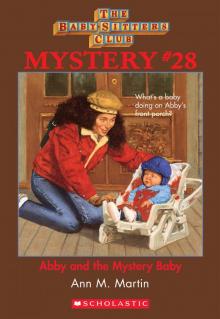 Abby and the Mystery Baby
Abby and the Mystery Baby Home Is the Place
Home Is the Place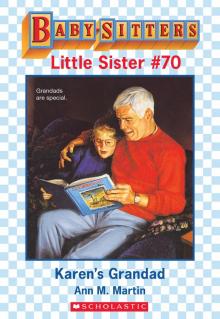 Karen's Grandad
Karen's Grandad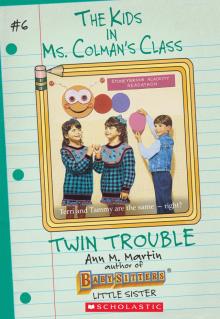 Twin Trouble
Twin Trouble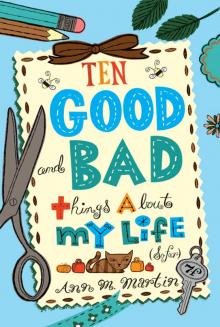 Ten Good and Bad Things About My Life (So Far)
Ten Good and Bad Things About My Life (So Far)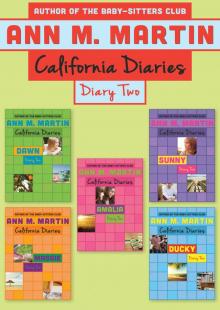 Diary Two
Diary Two Baby-Sitters Club 027
Baby-Sitters Club 027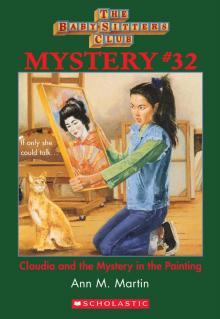 Claudia and the Mystery Painting
Claudia and the Mystery Painting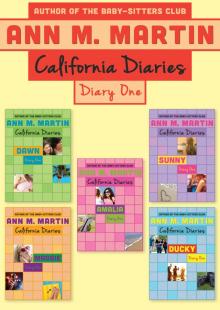 Diary One
Diary One Baby-Sitters Club 037
Baby-Sitters Club 037 Baby-Sitters Club 028
Baby-Sitters Club 028 Baby-Sitters Club 085
Baby-Sitters Club 085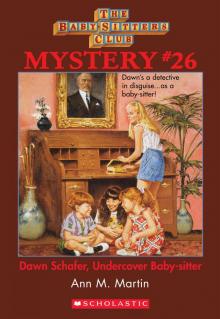 Dawn Schaffer Undercover Baby-Sitter
Dawn Schaffer Undercover Baby-Sitter Jessi's Babysitter
Jessi's Babysitter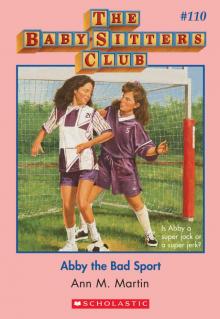 The Baby-Sitters Club #110: Abby the Bad Sport (Baby-Sitters Club, The)
The Baby-Sitters Club #110: Abby the Bad Sport (Baby-Sitters Club, The) Karen's Little Sister
Karen's Little Sister Baby-Sitters Club 058
Baby-Sitters Club 058 Claudia And The Genius On Elm St.
Claudia And The Genius On Elm St.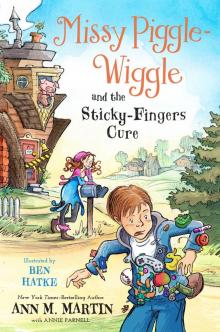 Missy Piggle-Wiggle and the Sticky-Fingers Cure
Missy Piggle-Wiggle and the Sticky-Fingers Cure Kristy and Kidnapper
Kristy and Kidnapper Baby-Sitters Club 041
Baby-Sitters Club 041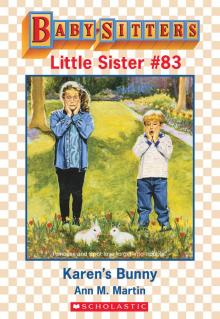 Karen's Bunny Trouble
Karen's Bunny Trouble Baby-Sitters Club 032
Baby-Sitters Club 032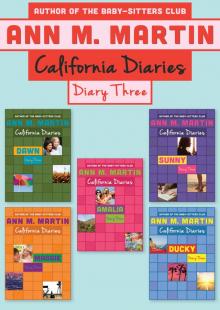 Diary Three
Diary Three Christmas Chiller
Christmas Chiller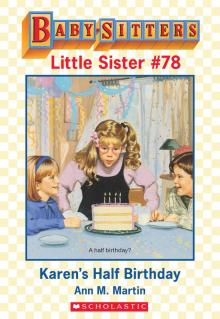 Karen's Half-Birthday
Karen's Half-Birthday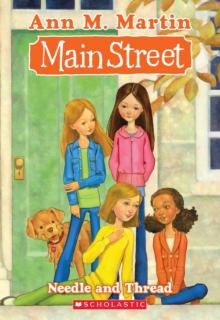 Needle and Thread
Needle and Thread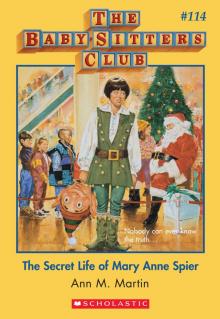 Secret Life of Mary Anne Spier
Secret Life of Mary Anne Spier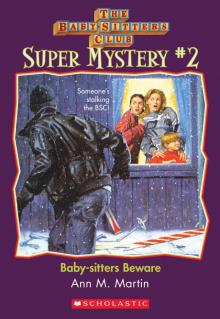 Baby-Sitters Beware
Baby-Sitters Beware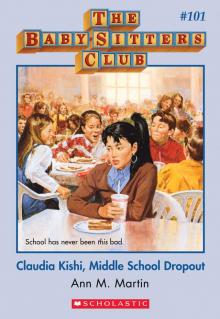 Claudia Kishi, Middle School Drop-Out
Claudia Kishi, Middle School Drop-Out Logan Likes Mary Anne !
Logan Likes Mary Anne ! Baby-Sitters Club 061
Baby-Sitters Club 061 Best Friends
Best Friends Baby-Sitters Club 031
Baby-Sitters Club 031 Karen's Little Witch
Karen's Little Witch Jessi Ramsey, Petsitter
Jessi Ramsey, Petsitter Baby-Sitters Club 123
Baby-Sitters Club 123 Baby-Sitters Club 059
Baby-Sitters Club 059 Baby-Sitters Club 033
Baby-Sitters Club 033 Baby-Sitters Club 060
Baby-Sitters Club 060 Baby-Sitters Club 094
Baby-Sitters Club 094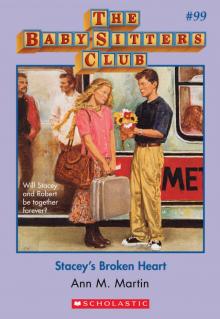 The Baby-Sitters Club #99: Stacey's Broken Heart
The Baby-Sitters Club #99: Stacey's Broken Heart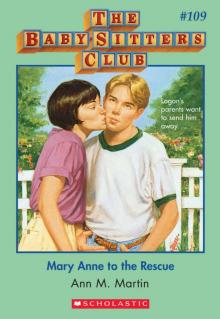 The Baby-Sitters Club #109: Mary Anne to the Rescue (Baby-Sitters Club, The)
The Baby-Sitters Club #109: Mary Anne to the Rescue (Baby-Sitters Club, The) Mystery At Claudia's House
Mystery At Claudia's House Claudia And The Sad Goodbye
Claudia And The Sad Goodbye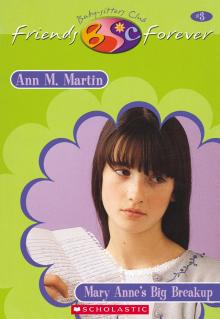 Mary Anne's Big Break-Up
Mary Anne's Big Break-Up Baby-Sitters Club 025
Baby-Sitters Club 025 Baby-Sitters Club 042
Baby-Sitters Club 042 Stacey and the Mystery of the Empty House
Stacey and the Mystery of the Empty House Karen's Baby-Sitter
Karen's Baby-Sitter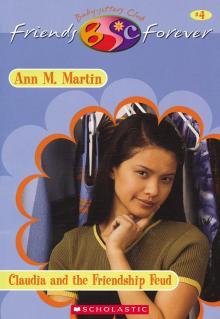 Claudia's Friendship Feud
Claudia's Friendship Feud Baby-Sitters Club 090
Baby-Sitters Club 090 Baby-Sitters Club 021
Baby-Sitters Club 021 Baby-Sitters Club 056
Baby-Sitters Club 056 Baby-Sitters Club 040
Baby-Sitters Club 040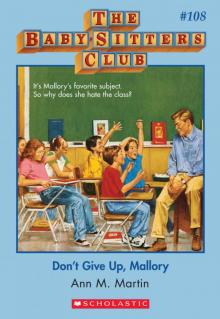 The Baby-Sitters Club #108: Don't Give Up, Mallory (Baby-Sitters Club, The)
The Baby-Sitters Club #108: Don't Give Up, Mallory (Baby-Sitters Club, The)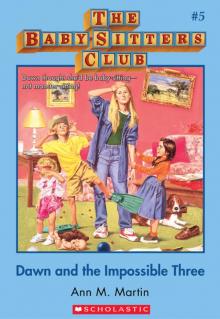 Dawn and the Impossible Three
Dawn and the Impossible Three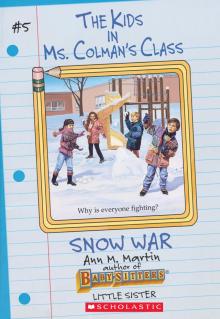 The Snow War
The Snow War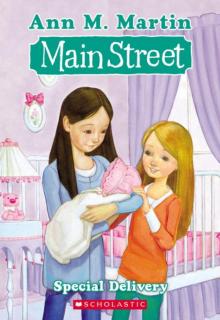 Special Delivery
Special Delivery Baby-Sitters Club 057
Baby-Sitters Club 057 Mary Anne And Too Many Babies
Mary Anne And Too Many Babies Baby-Sitters Club 030
Baby-Sitters Club 030